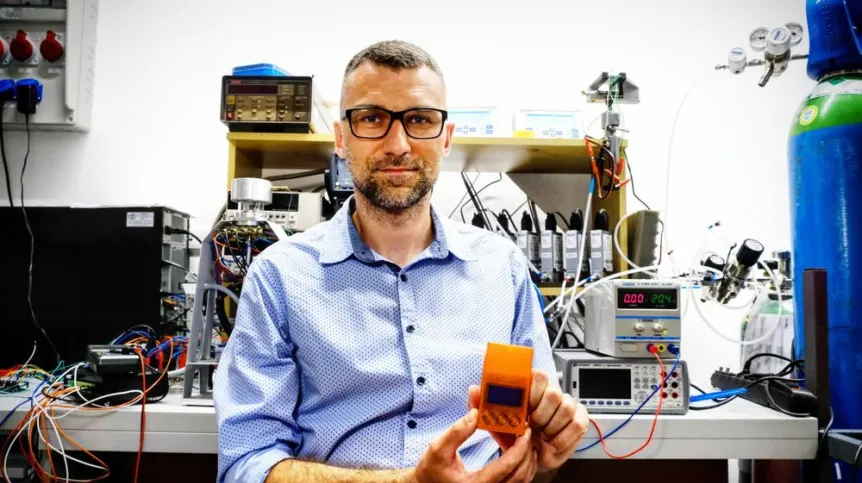
It look and works like an ordinary breathalyser, but instead of measuring the ethanol content in the exhaled air, it determines the level of ketone bodies and thus allows to diagnose diabetes and monitor its course.
Dubbed the ‘Diabetomat’ (diabetalyser), its creator Dr. Artur Ridosz from the AGH University of Science and Technology in Kraków, says that in the future, such devices will allow diabetics to live without needles.
Currently, a person monitoring blood sugar at home can do this with a glucometer used to prick the skin to collect and analyse a blood drop and determine the glucose level.
Dr. Rydosz said: “The biggest advantage of our device is that a diabetic will not have to puncture so many times. Currently, on average, it must be done 12 times a day, everyday, without interruption. Our device is designed to help these people catch a breath and even if pricking can not be completely eliminated, each puncture less per day increases the comfort of life of these people, and that is our goal.”
A device is based on the analysis of the chemical composition of the specific person's exhaled air.
Rydosz said: “People exhale a number of substances, whose concentrations are correlated with what is happening in the body. We detect ketone bodies. The device analyses the composition of exhaled air, measures the ketone body content and, based on an algorithm, refers to the given blood glucose level.”
The Diabetomat could therefore replace traditional blood sugar measurements by means of punctures and be used both daily by diabetics and for screening, to quickly and non-invasively diagnose patients.
The commercialisation process has already begun. A spin-off company Advanced Diagnostic Equipment has been established, and clinical trials financed by the National Centre for Research and Development have begun.
Rydosz said: “If all trials are successful and another lockdown does not stop us, the product may be available in Poland in 3-5 years.”
He added: “Preliminary estimates indicate that the device should be within reach of the average patient. But my dream would be that every patient should receive such a device for free, which of course, is unfortunately not possible for many reasons.
“On one hand, the progress and development of electronics means that all devices to become cheaper, but at the same time we should not forget that clinical trials are very cost-intensive and without sponsorship support virtually impossible.”
He continued: “However, the greater the competition among scientists, the better it is for patients. This improves the chances that such a device will appear on the market faster and will be cheaper.”
Work on the Diabetomat is carried out in the Biomarker Analysis Laboratory by Dr Rydosz's team at the AGH University of Science and Technology.
Rydosz is also the president of the foundation 'Z cukrzycą na ty' ('On the First Name Basis with Diabetes'), which helps people with diabetes. In addition, the scientist has announced the release of his book that collects and presents the latest achievements in solutions for diabetics, titled Diabetes Without Needles. (PAP)
author: Agnieszka Kliks-Pudlik
akp/ ekr/ kap/
tr. RL













